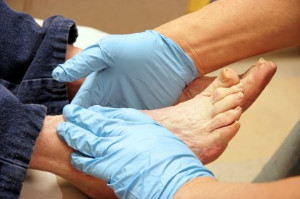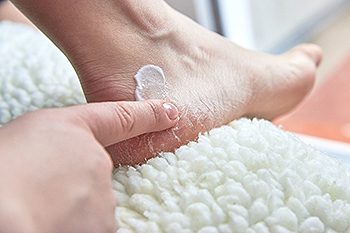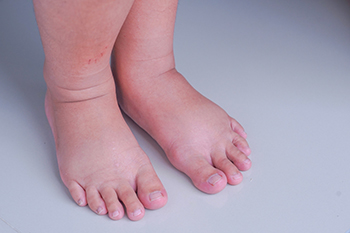Items filtered by date: January 2024
Causes of Ankle Pain at Night

Experiencing ankle pain at night is a common and distressing phenomenon that disrupts sleep and affects daily life. The root causes of this discomfort are diverse, ranging from common injuries to underlying health conditions. One prevalent contributor is ankle sprains or twists that may stem from injuries or small ligament tears and result in persistent pain and swelling. Plantar fasciitis, a leading cause of ankle pain, affects millions in the United States. It results in heel pain and is linked to chronic overload, whether from lifestyle or exercise. Ligament sprains, occurring during sudden foot movements or twists, are another common trigger of ankle pain, with exercise, walking, or missteps being potential instigators. Stress fractures, though not complete, can lead to nighttime ankle pain due to repeated stress on foot bones. Conditions such as gout, poor circulation, and arthritis also play a role in causing ankle discomfort. Addressing the root cause of nighttime ankle pain is pivotal for obtaining relief and restoring a peaceful night's sleep, promoting overall well being. For an exam and diagnosis, it is suggested that you schedule an appointment with a podiatrist.
Ankle pain can be caused by a number of problems and may be potentially serious. If you have ankle pain, consult with one of our podiatrists from Quad Cities Foot and Ankle Associates. Our doctors will assess your condition and provide you with quality foot and ankle treatment.
Ankle pain is any condition that causes pain in the ankle. Due to the fact that the ankle consists of tendons, muscles, bones, and ligaments, ankle pain can come from a number of different conditions.
Causes
The most common causes of ankle pain include:
- Types of arthritis (rheumatoid, osteoarthritis, and gout)
- Ankle sprains
- Broken ankles
- Achilles tendonitis
- Achilles tendon rupture
- Stress fractures
- Bursitis
- Tarsal tunnel syndrome
- Plantar fasciitis
Symptoms
Symptoms of ankle injury vary based upon the condition. Pain may include general pain and discomfort, swelling, aching, redness, bruising, burning or stabbing sensations, and/or loss of sensation.
Diagnosis
Due to the wide variety of potential causes of ankle pain, podiatrists will utilize a number of different methods to properly diagnose ankle pain. This can include asking for personal and family medical histories and of any recent injuries. Further diagnosis may include sensation tests, a physical examination, and potentially x-rays or other imaging tests.
Treatment
Just as the range of causes varies widely, so do treatments. Some more common treatments are rest, ice packs, keeping pressure off the foot, orthotics and braces, medication for inflammation and pain, and surgery.
If you have any questions, please feel free to contact our offices located in Bettendorf, and DeWitt, IA and Rock Island, IL . We offer the newest diagnostic and treatment technologies for all your foot care needs.
Do You Suffer From Painful Feet?
Progression of Diabetic Foot Problems

Diabetic foot problems associated with diabetes mellitus can affect one or both feet in type one or type two diabetes cases. These issues, often linked to nerve damage and circulatory problems inherent to diabetes, exhibit symptoms over time. Common diabetic foot problems include skin complications and structural foot alterations, foot ulcers, infections, and foot structure changes. The root cause of diabetic foot problems lies in inadequate insulin regulation, as diabetes disrupts insulin production or responsiveness. Elevated blood sugar levels, over time, inflict nerve damage, leading to peripheral neuropathy and hindered blood circulation, resulting in peripheral artery disease, or PAD. Peripheral neuropathy symptoms can consist of numbness, tingling, and diminished sensation in the feet, making ulcer detection challenging. Left untreated, infections can fester due to impaired blood flow, potentially leading to gangrene and tissue death. Early-stage diabetic foot problems often go unnoticed but can be identified by leg pain, numbness, and skin changes. Timely intervention is crucial. Diabetic foot issues progress at varying rates. Untreated complications may entail ulcers, corns, deformities, muscle weakness, and impaired blood flow. Seeking professional treatment for wounds and infections is vital, with treatments like wound dressings, antibiotics, off-loading devices, and debridement. In severe cases, surgical intervention, such as vascular procedures, skin grafts, or deformity correction may be necessary. If you suffer from diabetic foot problems, it is strongly suggested that you schedule regular appointments with a podiatrist to monitor your feet and do all that is necessary to prevent problems from arising and taking care of those that do.
Diabetic foot care is important in preventing foot ailments such as ulcers. If you are suffering from diabetes or have any other concerns about your feet, contact one of our podiatrists from Quad Cities Foot and Ankle Associates. Our doctors can provide the care you need to keep you pain-free and on your feet.
Diabetic Foot Care
Diabetes affects millions of people every year. The condition can damage blood vessels in many parts of the body, especially the feet. Because of this, taking care of your feet is essential if you have diabetes, and having a podiatrist help monitor your foot health is highly recommended.
The Importance of Caring for Your Feet
- Routinely inspect your feet for bruises or sores.
- Wear socks that fit your feet comfortably.
- Wear comfortable shoes that provide adequate support.
Patients with diabetes should have their doctor monitor their blood levels, as blood sugar levels play such a huge role in diabetic care. Monitoring these levels on a regular basis is highly advised.
It is always best to inform your healthcare professional of any concerns you may have regarding your feet, especially for diabetic patients. Early treatment and routine foot examinations are keys to maintaining proper health, especially because severe complications can arise if proper treatment is not applied.
If you have any questions please feel free to contact our offices located in Bettendorf, and DeWitt, IA and Rock Island, IL . We offer the newest diagnostic and treatment technologies for all your foot and ankle needs.
Athlete’s Foot and Cracked Heels

Cracked heels are a common foot ailment, but one surprising cause is the fungal infection known as athlete's foot. Although it typically presents as itchy, scaly skin on the soles and between the toes, athlete's foot can also affect the heels, leading to painful fissures. If extra moisturizing does not help this problem, cracked heels may be a result of an underlying health condition such as hypothyroidism or diabetes. Additionally, Sjögren's syndrome, a condition that hinders moisture production, or the presence of bone spurs in the heels may indicate cracked heels. These conditions require thorough evaluation and appropriate medical management to ensure comprehensive foot health. If you have persistent cracked heels, it is suggested that you schedule an appointment with a podiatrist for a proper diagnosis and effective treatment.
Cracked heels are unsightly and can cause further damage to your shoes and feet. If you have any concerns, contact one of our podiatrists from Quad Cities Foot and Ankle Associates. Our doctors can provide the care you need to keep you pain-free and on your feet.
Cracked Heels
Cracked heels appear unappealing and can make it harder for you walk around in sandals. Aside from looking unpleasant, cracked heels can also tear stockings, socks, and wear out your shoes. There are several methods to help restore a cracked heel and prevent further damage.
How Do You Get Them?
Dry skin is the number one culprit in creating cracked heels. Many athletes, walkers, joggers, and even swimmers suffer from cracked heels. Age and skin oil production play a role to getting cracked heels as well.
Promote Healing
Over the counter medicines can help, especially for those that need instant relief or who suffer from chronic dry feet.
Wear Socks – Wearing socks with medicated creams helps lock in moisture.
Moisturizers – Applying both day and night will help alleviate dryness which causes cracking.
Pumice Stones – These exfoliate and remove dead skin, which allows for smoother moisturizer application and better absorption into the skin.
Change in Diet
Eating healthy with a well-balanced diet will give the skin a fresh and radiant look. Your body responds to the kinds of food you ingest. Omega-3 fatty acids and zinc supplements can also revitalize skin tissue.
Most importantly, seek professional help if unsure how to proceed in treating cracked heels. A podiatrist will help you with any questions or information needed.
If you have any questions, please feel free to contact our offices located in Bettendorf, and DeWitt, IA and Rock Island, IL . We offer the newest diagnostic and treatment technologies for all your foot care needs.
Assessment of Foot Wounds in Diabetics

The importance of addressing diabetic foot complications cannot be overemphasized. These issues are widespread and intricate, underscoring the need for proactive assessments by podiatrists. It is vital for all diabetic patients to undergo periodic foot evaluations to identify potential factors that may lead to ulcers or amputations, such as neuropathy, vascular problems, and deformities. Depending on their risk level, patients with abnormalities may require more frequent foot assessments. By implementing systematic examinations, risk assessments, patient education, and timely referrals, the prevalence of lower extremity complications can be reduced. If you are diabetic, it is strongly suggested that you schedule appointments with a podiatrist for ongoing evaluations of your feet. This proactive approach is essential to enhance your overall well-being and quality of life.
Wound care is an important part in dealing with diabetes. If you have diabetes and a foot wound or would like more information about wound care for diabetics, consult with one of our podiatrists from Quad Cities Foot and Ankle Associates. Our doctors will assess your condition and provide you with quality foot and ankle treatment.
What Is Wound Care?
Wound care is the practice of taking proper care of a wound. This can range from the smallest to the largest of wounds. While everyone can benefit from proper wound care, it is much more important for diabetics. Diabetics often suffer from poor blood circulation which causes wounds to heal much slower than they would in a non-diabetic.
What Is the Importance of Wound Care?
While it may not seem apparent with small ulcers on the foot, for diabetics, any size ulcer can become infected. Diabetics often also suffer from neuropathy, or nerve loss. This means they might not even feel when they have an ulcer on their foot. If the wound becomes severely infected, amputation may be necessary. Therefore, it is of the upmost importance to properly care for any and all foot wounds.
How to Care for Wounds
The best way to care for foot wounds is to prevent them. For diabetics, this means daily inspections of the feet for any signs of abnormalities or ulcers. It is also recommended to see a podiatrist several times a year for a foot inspection. If you do have an ulcer, run the wound under water to clear dirt from the wound; then apply antibiotic ointment to the wound and cover with a bandage. Bandages should be changed daily and keeping pressure off the wound is smart. It is advised to see a podiatrist, who can keep an eye on it.
If you have any questions, please feel free to contact our offices located in Bettendorf, and DeWitt, IA and Rock Island, IL . We offer the newest diagnostic and treatment technologies for all your foot care needs.
Lymphoedema and Swelling of the Feet

Lymphoedema is a condition where the legs or feet swell due to fluid buildup because the body's lymphatic system, which functions similarly to veins, is struggling to remove it. This swelling is called edema and can happen when you do not move enough, such as after sitting for long periods during a flight. Persistent swelling of the feet, swelling that lasts over three months, is known as chronic edema, which suggests the beginning of lymphatic failure or early lymphoedema. If left untreated, chronic foot edema can cause skin changes, deeper tissue damage, and increase the risk of infections such as cellulitis. It is often associated with chronic venous insufficiency. Various factors can contribute to lymphoedema, including genetics, obesity, inactivity, vein problems, or damage from cancer treatments. Joint surgery may also impair lymphatic vessels, leading to lymphoedema. If you are experiencing swollen feet on a regular basis, it is suggested that you make an appointment with a podiatrist as quickly as possible to obtain treatment and prevent serious complications.
Swollen feet can be a sign of an underlying condition. If you have any concerns, contact one of our podiatrists of Quad Cities Foot and Ankle Associates. Our doctors can provide the care you need to keep you pain-free and on your feet.
Swollen feet are a common ailment among pregnant women and people who stand or sit for extended periods. Aging may increase the possibility of swollen feet and patients who are obese often notice when their feet are swelling too. There may be medical reasons why swollen feet occur:
- Phlebitis - A condition that causes the veins to become inflamed and can also cause leg pain.
- Liver disease - This may lead to low blood levels of albumin which is a protein. This can cause fluid in the blood to pass into the tissues and several areas of the body can become swollen.
- Heart failure - When the heart doesn’t pump properly the blood that is normally pumped back to the heart can pool in the veins of the legs causing swollen feet.
- Kidney disease - One of the main functions of the kidneys is releasing excess fluid in the body. This type of condition can make it difficult for the kidneys to function properly, and as a result the feet may become swollen.
- Deep-vein thrombosis (DVT)- This is a serious condition where blood clots form in the veins of the legs. They can block the return of blood from the legs to the heart which may cause the feet to swell. It is important to be treated by a podiatrist if this condition is present.
Swollen feet can also be caused by bone and tendon conditions, including fractures, arthritis, and tendinitis. Additionally, there may be skin and toenail conditions and an infection may cause the feet to swell. Patients who take medicine to treat high blood pressure may be prone to getting swollen feet.
Many patients elevate their feet to help relieve the swelling and this is generally a temporary remedy. When a podiatrist is consulted the reason behind the swelling can be uncovered and subsequently treated.
If you have any questions please feel free to contact our offices located in Bettendorf, and DeWitt, IA and Rock Island, IL . We offer the newest diagnostic tools and technology to treat your foot and ankle needs.

